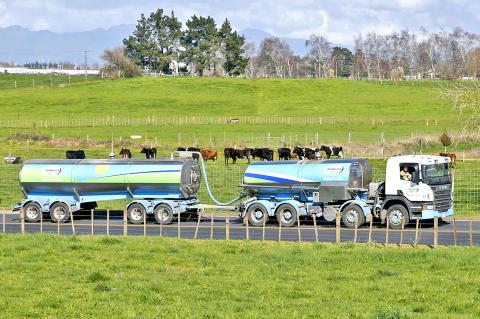New Zealand dairy exporter Fonterra Co-operative Group Ltd is cutting jobs in an effort to shore up its cash flows as a slump in global dairy demand, particularly from No. 1 buyer China, threatens to snuff out the country’s “white gold rush.”
Dairy prices have more than halved from record highs scaled in 2013, with Chinese buying dropping off dramatically after the world’s second-biggest economy built up excess supplies of milk powder last year just as the economy began to slow.
Fonterra has dominated the commodity milk powder sector for years and had been rapidly expanding its business in China.

Photo: Reuters
Profits have been falling for nearly two years in the face of volatile dairy prices, which sank to a 12-and-a-half-year low at the latest global auction on Wednesday.
As a result, Fonterra yesterday said that it would cut more than 500 of its 16,000-strong global workforce, adding that more redundancies were likely as it reviews its operations.
New Zealand’s dairy exports to China have tumbled 69 percent since the start of the year compared with last year, official data shows, whittling Beijing’s share of the country’s total dairy shipments to roughly 16 percent, from 37 percent last year.
At the same time, a ban by Russia on foreign dairy products, imposed in response to sanctions slapped on the country over its role in the Ukraine conflict, has removed a major buyer of butter and other milk products.
Meanwhile, supply has ramped up as farmers in New Zealand, Europe and the US have set up dairy farms in hopes of cashing in on a doubling in dairy prices between 2009 and 2013.
Production in New Zealand, the world’s biggest dairy exporter, has reached record highs.
Industry sources say Chinese processors are still working through stockpiles of imported milk powder, prized over domestic offerings due to past safety scares. That has kept Chinese buyers out of the market since the start of the year.
Analysts see the risk of prices falling further, with demand unlikely to pick up soon as Chinese processors work through their existing stocks.

The Eurovision Song Contest has seen a surge in punter interest at the bookmakers, becoming a major betting event, experts said ahead of last night’s giant glamfest in Basel. “Eurovision has quietly become one of the biggest betting events of the year,” said Tomi Huttunen, senior manager of the Online Computer Finland (OCS) betting and casino platform. Betting sites have long been used to gauge which way voters might be leaning ahead of the world’s biggest televised live music event. However, bookmakers highlight a huge increase in engagement in recent years — and this year in particular. “We’ve already passed 2023’s total activity and

Nvidia Corp CEO Jensen Huang (黃仁勳) today announced that his company has selected "Beitou Shilin" in Taipei for its new Taiwan office, called Nvidia Constellation, putting an end to months of speculation. Industry sources have said that the tech giant has been eyeing the Beitou Shilin Science Park as the site of its new overseas headquarters, and speculated that the new headquarters would be built on two plots of land designated as "T17" and "T18," which span 3.89 hectares in the park. "I think it's time for us to reveal one of the largest products we've ever built," Huang said near the

China yesterday announced anti-dumping duties as high as 74.9 percent on imports of polyoxymethylene (POM) copolymers, a type of engineering plastic, from Taiwan, the US, the EU and Japan. The Chinese Ministry of Commerce’s findings conclude a probe launched in May last year, shortly after the US sharply increased tariffs on Chinese electric vehicles, computer chips and other imports. POM copolymers can partially replace metals such as copper and zinc, and have various applications, including in auto parts, electronics and medical equipment, the Chinese ministry has said. In January, it said initial investigations had determined that dumping was taking place, and implemented preliminary

Intel Corp yesterday reinforced its determination to strengthen its partnerships with Taiwan’s ecosystem partners including original-electronic-manufacturing (OEM) companies such as Hon Hai Precision Industry Co (鴻海精密) and chipmaker United Microelectronics Corp (UMC, 聯電). “Tonight marks a new beginning. We renew our new partnership with Taiwan ecosystem,” Intel new chief executive officer Tan Lip-bu (陳立武) said at a dinner with representatives from the company’s local partners, celebrating the 40th anniversary of the US chip giant’s presence in Taiwan. Tan took the reins at Intel six weeks ago aiming to reform the chipmaker and revive its past glory. This is the first time Tan